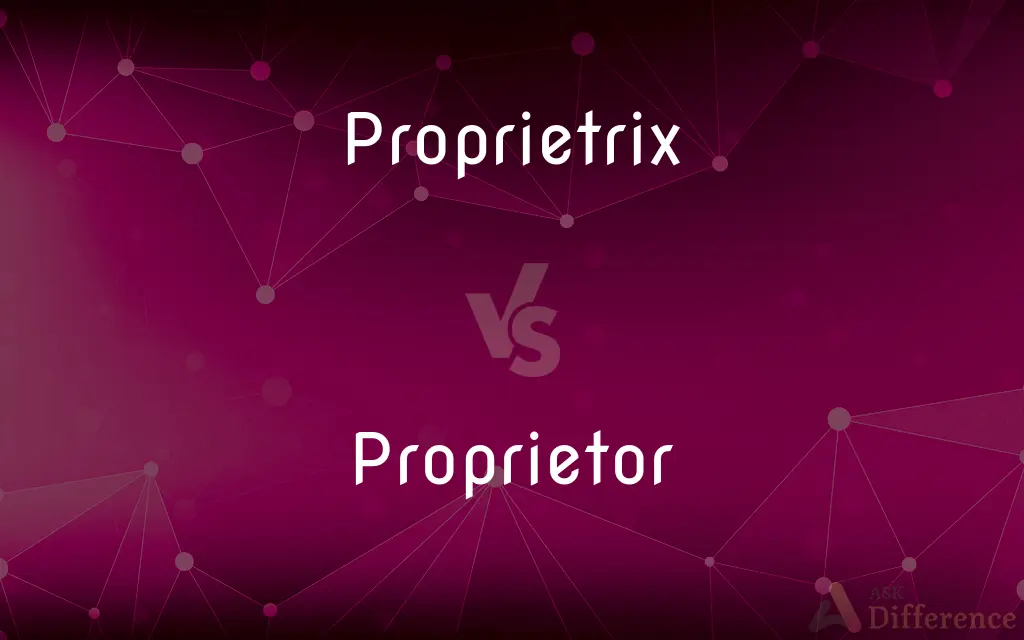Proprietrix vs. Proprietor — What's the Difference?
By Fiza Rafique & Maham Liaqat — Updated on April 7, 2024
Proprietrix refers to a female owner of a business or property, while proprietor is a gender-neutral term for an owner, traditionally male-oriented.

Difference Between Proprietrix and Proprietor
Table of Contents
ADVERTISEMENT
Key Differences
Proprietrix is used specifically to denote a female owner of a business or an estate, emphasizing the gender of the proprietor. Whereas proprietor is a more commonly used, gender-neutral term that applies to any owner of a business or property, regardless of their gender.
The use of "proprietrix" highlights the gender of the business or property owner, reflecting older linguistic practices where gender-specific titles were more common. On the other hand, "proprietor" is used in modern contexts where the emphasis is on the role rather than the gender of the individual.
In legal and formal documents, "proprietrix" was once used to clarify the gender of the owner, particularly when legal rights and responsibilities were closely tied to gender. However, "proprietor" has become the preferred term in contemporary usage, aligning with a shift towards more inclusive and gender-neutral language.
The term "proprietrix" can be seen in historical contexts or when there is a deliberate choice to highlight the female leadership of a business, adding a dimension of gender awareness. In contrast, "proprietor" is used universally across various industries and contexts without specifying the owner's gender, making it a more versatile term.
While "proprietrix" carries a certain historical and gender-specific connotation, "proprietor" is neutral and focuses solely on the ownership aspect, regardless of the owner's gender. This shift reflects broader societal movements towards gender equality and the recognition of women in business and leadership roles.
ADVERTISEMENT
Comparison Chart
Gender
Female
Gender-neutral (traditionally male-oriented)
Usage Context
Historical, emphasizing female ownership
Modern, universal ownership regardless of gender
Legal Documents
Used to specify gender in ownership
Used without specifying gender
Contemporary Use
Less common, with a focus on highlighting female leadership
Commonly used across all contexts
Societal Implication
Reflects historical gender distinctions in business
Reflects contemporary move towards gender-neutral language
Compare with Definitions
Proprietrix
More commonly used in the past to denote female business ownership.
As a proprietrix in the 19th century, her achievements were notable.
Proprietor
Signifies a shift towards inclusivity and equality in language and business roles.
The proprietor's leadership was key to the organization's success.
Proprietrix
Refers specifically to a woman who owns a business or property.
The proprietrix of the bookstore hosted weekly readings.
Proprietor
Preferred in modern legal documents and agreements.
The lease agreement lists John Doe as the proprietor.
Proprietrix
Can signal empowerment and recognition of women in roles of authority and ownership.
The museum, founded by its proprietrix, focuses on women's art.
Proprietor
Reflects contemporary preference for gender-neutral terms in business.
The proprietor of the cafe implemented eco-friendly practices.
Proprietrix
Emphasizes the owner's gender, used in contexts where this distinction is relevant.
The proprietrix invested her inheritance into the estate.
Proprietor
A gender-neutral term for anyone who owns a business or property.
The proprietor expanded the company internationally.
Proprietrix
Once prevalent to clarify ownership rights tied to gender.
The contract named her as the sole proprietrix of the property.
Proprietor
Applies across all industries and types of ownership without implying gender.
As the new proprietor, he introduced innovative services.
Proprietrix
Proprietress.
Proprietor
The owner of a business, or a holder of property
Chinese restaurant proprietors
By 1640 he was himself the proprietor of a three-hundred-acre tract
Proprietrix
(dated) A female proprietor.
Proprietor
One who has legal title to something; an owner.
Proprietor
One who owns or owns and manages a business or other such establishment.
Proprietor
An owner.
Proprietor
A sole owner of an unincorporated business, also called a sole proprietor.
Proprietor
One of the owners of an unincorporated business, a partner.
Proprietor
(history) One or more persons to whom a colonial territory is assigned, like a fief, including its administration.
From 10 September 1621 till 12 June 1632, Sir William Alexander, styled Earl of Stirling and Viscount of Canada, was proprietor of the Scottish colony Nova Scotia.
Proprietor
One who has the legal right or exclusive title to anything, whether in possession or not; an owner; as, the proprietor of farm or of a mill.
Proprietor
(law) someone who owns (is legal possessor of) a business;
He is the owner of a chain of restaurants
Common Curiosities
What is the difference between a proprietrix and a proprietor?
"Proprietrix" specifically refers to a female owner, while "proprietor" is a gender-neutral term for an owner.
Does the use of "proprietrix" imply a different type of ownership than "proprietor"?
No, both imply ownership of a business or property; the difference lies in the gender emphasis.
Is "proprietrix" still commonly used today?
It is less common and tends to be used in contexts that wish to emphasize female ownership.
Can a man be referred to as a proprietrix?
No, "proprietrix" is specifically used for female owners.
Why might someone choose to use "proprietor" instead of "proprietrix"?
"Proprietor" is gender-neutral and reflects a modern, inclusive approach to language.
How does the use of "proprietrix" impact perceptions of a business?
It can highlight female leadership and ownership, possibly influencing public perception positively.
How does the choice between "proprietrix" and "proprietor" reflect societal values?
It reflects shifting norms towards gender equality and inclusivity in language.
Does the choice of term have legal implications in business ownership?
Generally, no. Legal rights and responsibilities of ownership are not affected by the choice of term.
In legal terms, is there a preference for using "proprietor" over "proprietrix"?
Yes, modern legal language tends towards "proprietor" for its gender neutrality.
Are there industries where "proprietrix" is more commonly used?
It may be more common in historical contexts or when emphasizing traditional roles of women.
Can the terms "proprietrix" and "proprietor" be used interchangeably?
Technically no, due to their gender-specific nature. "Proprietor" is always safe to use for any gender.
Is "proprietor" acceptable in all business contexts?
Yes, "proprietor" is universally acceptable and understood across all business contexts.
How can businesses decide which term to use?
The decision can be based on the preference for modern, inclusive language or the desire to highlight female ownership.
What does the use of "proprietrix" versus "proprietor" say about societal progress?
It illustrates the evolution from gender-specific titles towards a more inclusive approach that focuses on roles rather than gender.
How do cultural perceptions of gender roles influence the use of these terms?
Cultural perceptions can dictate whether the gender-specific "proprietrix" is used or the neutral "proprietor."
Share Your Discovery

Previous Comparison
Twine vs. String
Next Comparison
Location vs. PositionAuthor Spotlight
Written by
Fiza RafiqueFiza Rafique is a skilled content writer at AskDifference.com, where she meticulously refines and enhances written pieces. Drawing from her vast editorial expertise, Fiza ensures clarity, accuracy, and precision in every article. Passionate about language, she continually seeks to elevate the quality of content for readers worldwide.
Co-written by
Maham Liaqat












































